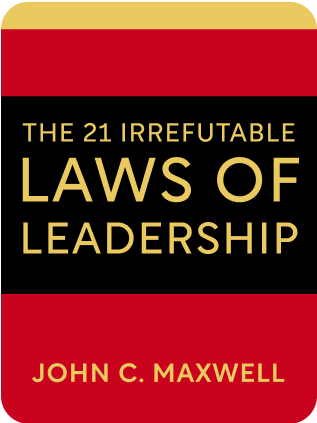

This article is an excerpt from the Shortform book guide to "The 21 Irrefutable Laws Of Leadership" by John C. Maxwell. Shortform has the world's best summaries and analyses of books you should be reading.
Like this article? Sign up for a free trial here .
Do you want to make a difference in the lives of others? Do you want to change the world?
To do anything meaningful, you’re going to have to work with people. And, if you’re working with people, you need to know how to lead them. Leadership guru John C. Maxwell shares 21 laws that you should follow if you want to be a leader of true influence and impact.
Continue reading for The 21 Irrefutable Laws of Leadership study guide we’ve put together to help you apply the laws to your leadership.
Study Guide for The 21 Irrefutable Laws of Leadership
The 21 Irrefutable Laws of Leadership is a guide to the major principles of leadership. Learn how to connect with and influence people. Learn how to empower others and build an all-star leadership team. And learn how to create a succession plan and leave a legacy.
Seven exercises comprise The 21 Irrefutable Laws of Leadership study guide that follows. They’re sure to help you internalize and implement the laws.
Exercise #1: How Effective Are You?
Effectiveness is made up of two factors—dedication to success and leadership ability.
- On a scale of 1-10, where would you rank your leadership ability? Consider: When there’s a problem at work, do you brainstorm ways to solve it, or do you turn to others?
- On a scale of 1-10, what is your current dedication to success level?
- Multiply your scores. What is your overall effectiveness?
- Would you increase your score more by working on your leadership, or on your success level? Why?
Exercise #2: Develop Your Leadership Skills
The third phase of developing leadership is daily, targeted practice.
- What phase of leadership development are you currently in? Are you in the ignorance phase? Are you already practicing? How do you know you’re in this phase?
- Choose a skill you’d like to develop.
- What is something you can do, once, to improve this skill (for example, attend a conference, or interview an expert)?
- What can you do, daily, to improve this skill (for example, read a book on the subject for 20 minutes a day)?
Exercise #3: What Is Your Character Saying About You?
People follow morally upstanding leaders that they trust. What does your character communicate to your followers?
- What positive personality traits do your followers admire in you?
- How do you gain the respect of your followers? Remember that making good decisions, admitting your mistakes, and prioritizing others all contribute.
- What might be holding you back from gaining the full respect of your followers? (Do you fail to admit when you’re wrong? Do you tell half-truths?)
- How can you improve the message your character sends to followers?
Exercise #4: Learn to Trust Your Intuition
Everyone is intuitive in their area of strength. Once you’ve learned to trust your intuition in one area, you can start developing it in leadership.
- What is your greatest strength?
- Imagine you’re doing an activity that involves your greatest strength. You come up against a problem. What do your instincts tell you to do?
- Now, reflect on your instinctive reaction. How did you arrive at it? Did you “read” situations, resources, trends, people, or yourself? Did you know what to do because you’d seen the same problem many times before?
Exercise #5: Strengthen Your Leadership Team
A leader’s success is determined by the people on her leadership team.
- Who are the people currently in your inner circle? Consider family members, employees, mentors, and so on.
- Your team probably contains several people who are good at the same things you are. What are their strengths? Are they influential or morally upstanding? What skills does each person bring to the group?
- What skills does the team as a whole lack?
- Think of three people (at least one of whom is a leader) who possess the skills your team lacks. Consider adding them to your team.
Exercise #6: Increase Your Followers’ Motivation
Leaders create momentum by paying attention to intangibles such as motivation.
- Think about your organization. What factors are negatively affecting your employees’ motivation? How do you know?
- How can you remove these factors by creating momentum?
Exercise #7: Find and Retain Leaders
When leaders join your team, they bring along all their followers, which multiplies your reach.
- Are you primarily leading followers or other leaders? How do you know? Remember that followers need your direct attention and tend to be weaker, while leaders have the potential to take over for you.
- Think of specific ways you might find leaders. For example, you might find them by attending events or networking, or by developing leadership potential in people who already work with you.
- Consider how to recruit and keep the leaders you’ve brainstormed above. You might develop your own leadership skills, or create an exciting environment.

———End of Preview———
Like what you just read? Read the rest of the world's best book summary and analysis of John C. Maxwell's "The 21 Irrefutable Laws Of Leadership" at Shortform .
Here's what you'll find in our full The 21 Irrefutable Laws Of Leadership summary :
- Why working with people is the only way to do meaningful work
- How to become the kind of person that can get things done
- Why you don't need to be good at all the laws of leadership to be a good leader






